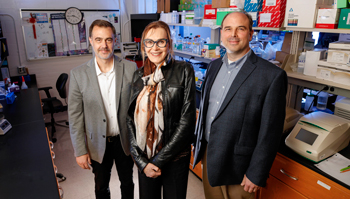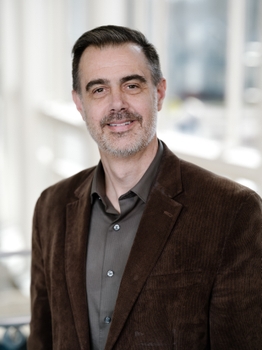News
RNA Discoveries Leading to Cutting-Edge Cures
Wednesday, April 23, 2025
 RNA, long overlooked in the research world, is having its moment.
RNA, long overlooked in the research world, is having its moment.
The pandemic provided the rocket fuel, because mRNA vaccines essentially saved our way of life. Talk of RNA-based treatments and trials is suddenly commonplace.
Both the 2023 and 2024 Nobel Prizes in physiology or medicine were awarded for research in RNA (ribonucleic acid). The Advanced Research Projects Agency for Health (ARPA-H), a $2 billion federal entity funding transformative ideas for health breakthroughs, focused its first multi-million-dollar grant on the development of mRNA technologies that strengthen the immune system to better fight cancer and other diseases. In 2022, more than $1 billion in private equity funds was invested in biotechnology start-ups to explore frontiers in RNA research. There are now more than 400 RNA-based drugs in development.
Less known is what happened before we were lining up to get shots in our arms to regain a semblance of normal life. The story of RNA research and its blossoming future began many decades earlier. The main characters were diligent, unsung scientists who believed in the importance of the work long before others did.
And key chapters are still being written by University of Rochester researchers who—decades prior—discovered properties of RNA that ended up being vital to the development of COVID-19 vaccines and that even launched an entire field of study on how mRNA activity contributes to disease.
“I’ve studied RNA since 1972,” said Lynne Maquat, PhD, founding director of the Center for RNA Biology at the University of Rochester. “We’ve gone from being in the last session at meetings under the context of ‘other things’ to being at the forefront in virtually every specialty.”

Thomas Cech, a biochemist at the University of Colorado (Boulder) and winner of the Nobel Prize in Chemistry in 1989, wrote in an opinion essay in The New York Times, “Though it is a linchpin of every living thing on Earth, RNA was misunderstood and underappreciated for decades—often dismissed as nothing more than a biochemical backup singer, slaving away in obscurity in the shadows of the diva, DNA. I know that firsthand: I was slaving away in obscurity on its behalf.”
Rochester researchers have been in those shadows for decades, quietly unraveling RNA’s role in the vast and complex process of gene expression. Even they could not have known their work would have such important implications for therapies. But it’s clear now—and new clinical trials are showing the life-changing promise of their once-obscure research.
Read More: RNA Discoveries Leading to Cutting-Edge CuresRNA and Cancer Scientist Eric Wagner Receives Lifetime Honor
Thursday, March 27, 2025
 Eric J. Wagner, PhD, professor of Biochemistry and Biophysics at the University of Rochester School of Medicine and Dentistry, was elected a fellow of the American Association for the Advancement of Science (AAAS), the world’s largest general scientific society and publisher of the journal Science. Wagner was selected for his contributions to the fields of molecular biology and biochemistry, particularly his research uncovering how human cells regulate the production of RNA from genes and how disruptions in this process lead to cancer and intellectual and developmental disabilities.
Eric J. Wagner, PhD, professor of Biochemistry and Biophysics at the University of Rochester School of Medicine and Dentistry, was elected a fellow of the American Association for the Advancement of Science (AAAS), the world’s largest general scientific society and publisher of the journal Science. Wagner was selected for his contributions to the fields of molecular biology and biochemistry, particularly his research uncovering how human cells regulate the production of RNA from genes and how disruptions in this process lead to cancer and intellectual and developmental disabilities.
Election as an AAAS Fellow is a lifetime honor within the scientific community. Wagner, co-director of the University of Rochester Center for RNA Biology, is one of 471 scientists, engineers, and innovators who were selected for the 2024 Fellow class for their scientifically and socially distinguished achievements throughout their careers.
“Eric is a card-carrying RNA biologist and powerhouse of technological developments whose work is increasing our understanding of the causes of neuroblastoma and other devastating brain disorders in children,” said Lynne E. Maquat, PhD, founding director of the University of Rochester Center for RNA Biology and the J. Lowell Orbison Endowed Chair and Professor of Biochemistry and Biophysics at the School of Medicine and Dentistry. “We’re extremely fortunate that we were able to recruit Eric back to Rochester as a co-director of both our RNA Center and our newly acquired NYS Center of Excellence in RNA Research and Therapeutics. I couldn’t ask for a more competent and engaged colleague to help further grow our strength in RNA research.”
Read More: RNA and Cancer Scientist Eric Wagner Receives Lifetime Honor